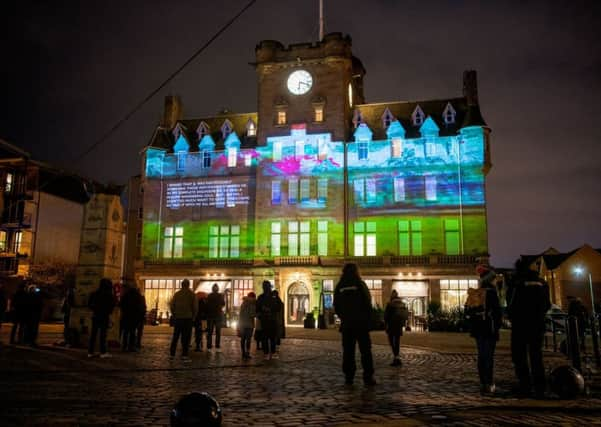Edinburgh’s Hogmanay review: Message From The Skies


Message From The Skies, various locations, Edinburgh ****
Now in its third year, Message From The Skies is a multi-media project – produced by Charlie Wood of Underbelly, and curated by Nick Barley of the Edinburgh International Book Festival – which links some of Scotland’s finest writers, musicians and moving-image artists with the very fabric of Edinburgh, its buildings and monuments. Two years ago, it was Val McDermid’s colossal effort, across eight city-centre locations, to reclaim Edinburgh’s literary history for the city’s forgotten female writers; last year, there were a series of vivid letters to Europe, as this most pro-European of British cities confronted the reality of Brexit.
This time, though, the theme is Shorelines, reflecting the Scottish Government’s Year of Coasts And Waters, 2020; and it’s one that seems to have had an inspirational impact not only on the five writers involved, but also on the visual and sound artists whose work helps amplify and embody their words. At Fountainbridge, in a Union Canal basin surrounded by gleaming 21st century flats and restaurants, the poet Kathleen Jamie – with images by Thomas Moulson – speaks from the perspective of a wave power turbine bringing new energy to Scotland from just beyond its shoreline; a tentative but inspiring symbol of hope, and of new times brought within our grasp by benign science.
Advertisement
Hide AdIn George Street, writer Charlotte Runcie, video designer Kate Charter, composer Pippa Murphy and wonderful singer-narrator Karine Polwart come together to create a truly superb short meditation on the meaning of Scotland’s lighthouses, at the building that has been the headquarters of the Northern Lighthouse Board since 1832. In the courtyard of the City Chambers in the High Street, with tourist cameras clicking wildly, Kayus Bankole of the band Young Fathers uses his own words, subtle reflective sound, and spectacular filmic images by Rianne White, to demand that we reflect on Scotland’s profound links with the Atlantic slave trade, and on how the wealth and power it brought to our shores still shapes our cities today.
Then it’s to the top of Calton Hill, with a fragile, cloud-hazed crescent moon rising behind the Nelson Monument, around whose famous telescope shape poet Robin Robertson, designers Cristina Spiteri and Susanna Murphy, and composer Alasdair Roberts create an extraordinarily moving journey around Scotland’s 10,000 miles of coast, from the Solway Firth in the south-west to Berwick in the south-east. And finally, it’s down to Leith, for a few dozen long, entertaining paragraphs projected on the front of the old seaman’s mission that is now the Malmaison Hotel, as Irvine Welsh - with video design by Norman Harman - reflects on how the old sea dogs who drank in the pubs of Leith helped him imagine a path into adulthood that didn’t just involve marrying the girl next door, and settling down in the same scheme where he grew up.
It’s a thrilling and life-enhancing journey, in other words, full of love, pride, anger, challenge, repentance and imagination, and a growing assurance in using this complex art-form to explore how Scotland has always felt itself bound to the world, not least through the city of Edinburgh and the port of Leith. See it, over the next three weeks; or miss a beautiful and rich reflective celebration on the history of our capital city, on its complex present, and on its many possible futures. Joyce McMillan
Until 25 January